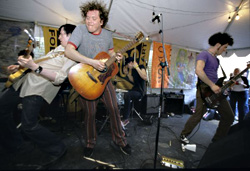Rob, the sort-of hero of Nick Hornby’s High Fidelity, is a self-centered jerk of a record-store owner looking to understand his failed love life within vinyl grooves. Does he listen to rock because he’s miserable, he wonders, or is it the other way around? Hornby’s point, of course, is that Rob’s acting like a feckless asshole and playing so many records are both responsible for his emotional isolation.
Karen Schoemer also has a music problem, though her likability, unlike Rob’s, isn’t in question. After lifting herself through the rock-criticism ranks to a mid-’90s star position at Newsweek, Schoemer finds herself blindsided by Connie Francis’ “Where the Boys Are.” Though considering the disc attitudinally retrograde, she nonetheless hears something speaking to her: the emotional urgency that once appealed to her mother when a ’50s teen. So she sets out in this music memoir/reappraisal not only to examine the white-bread pop that survived for a time beside Presley and Fats Domino on radio airwaves, but also to salvage crumbling relationships with both her parents (bitterly divorced for decades) by deciphering the music and its history. Not to mention, you guessed it, untangle her own romantic and sexual history.
Schoemer discovers the singers all over the map, in more ways than one. Touring the country to interview the likes of Patti Page and Pat Boone, Schoemer finds some agreeable (Page acknowledges the passivity of the sounds of her heyday), some flinty (Georgia Gibbs is still bitter about the criticism aimed at her by R&B stars whose hits she co-opted for Top 40 consumption), some fragile (Tommy Sands, who seeks to reassure himself that Schoemer’s mother is still living). Great Pretenders fits with a long-lived critical trend of rehabilitating once-unhip sounds. Schoemer finds some of the music hard to defend, even to herself; she also discovers charm and occasional transcendence in the performances of Gibbs, Sands, Fabian, and others.
She’s more successful with her musical rehabilitation than her familial one. Her thoughts about the male trivialization of women’s tastes are particularly incisive; it’s a topic that’s still too rarely discussed. By the end of these pages, though, her own story is somewhat resolved, but it’s the open-ended nature of the pop conversation she starts here that echoes after the book is closed.








